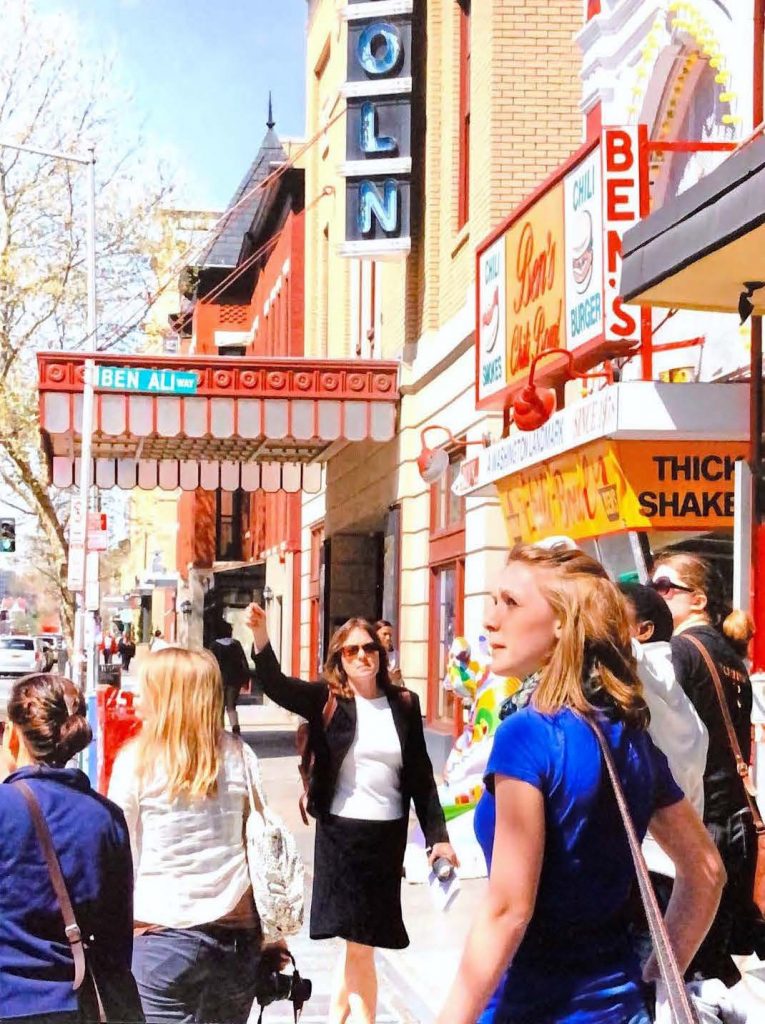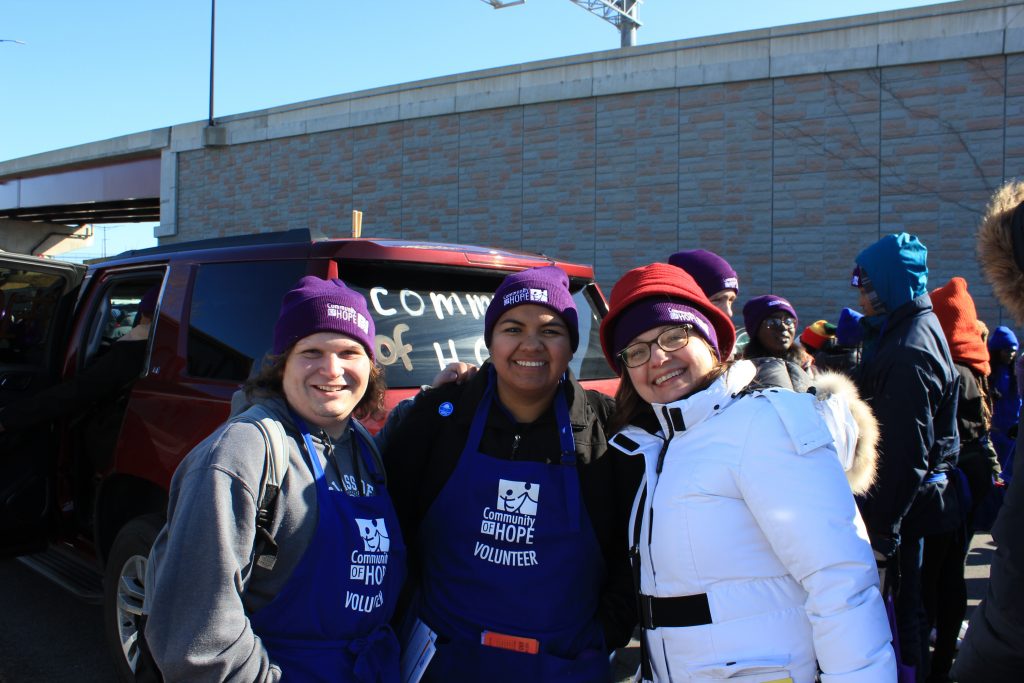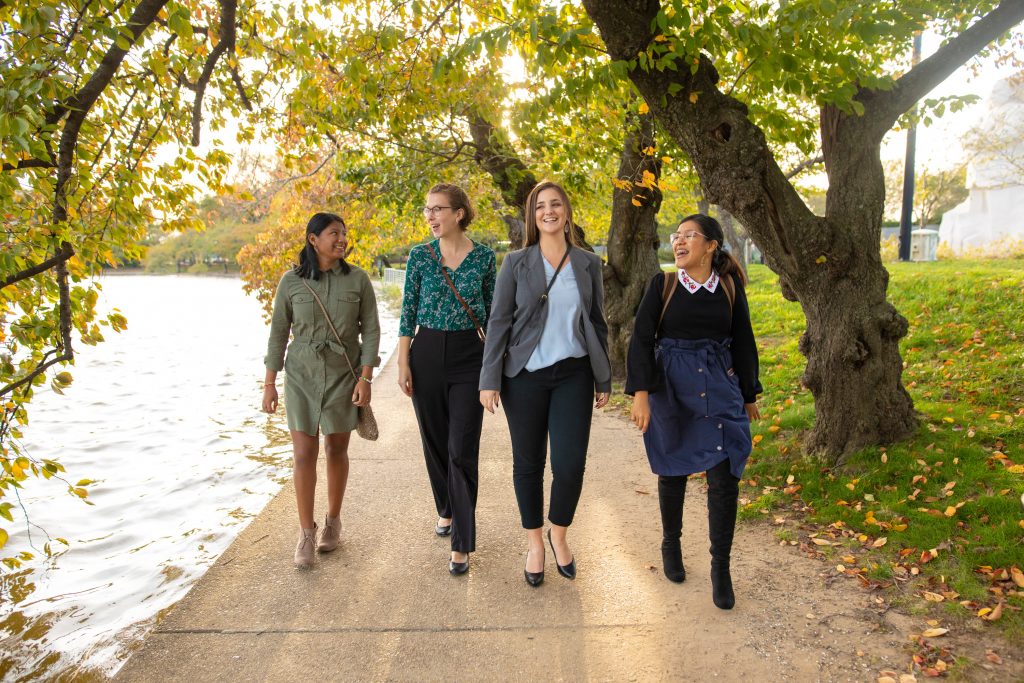A city divided, Washington D.C. is at once violent and magnificent. Its political and cultural institutions attract politicians, academicians, artists, and immigrants. Rhythm and color from around the globe embellish Washington’s streets and invigorate its neighborhoods.
Thus begins the syllabus of “Servant Leadership in the Urban Setting” taught by Professor Kimberly Schmidt, who recently announced her retirement after serving as director of Eastern Mennonite University’s Washington Community Scholars’ Center (WCSC) for 22 years.
In that time she’s helped to foster the interests and careers of countless EMU students, many of whom have left the program and the city with a unique and life-changing understanding of sociocultural dynamics and the legacy of history.

Besides the many programmatic and facility changes she engineered over the years, Schmidt is known among colleagues and former students for her relationship with the city itself, as evidenced by the intimate way in which she writes about it. One way she shared that relationship with her students was through historical walking tours – leading them down city streets and narrating the monuments, architecture, and murals they passed by.
“These experiences always focused on how the interrelated dynamics of race, gender, and class shaped the city’s polarities and disparities,” Schmidt explained.
Sabrina Tusing ’07, now a librarian with the Oregon City Public Library, remembers these tours fondly.
“I recall walking through Dupont Circle and learning about the life of Washington-born musician Duke Ellington and visiting a neighborhood to study architecture and artwork of the Langston Terrace Dwellings,” Tusing said. “My understanding of and appreciation for Washington D.C. was greatly enriched by the knowledge and passion shared by Kim.”
Chelsea Brubaker ’21, who was an intern at WCSC last fall, agreed.
“I would always have some sort of question about architecture or our destination, and she would always launch into a detailed explanation,” Brubaker said. “The conversations were fascinating. Kim was also unbelievably understanding in her own way, always making sure that the students were taken care of and that they were faring as well as they could be in the midst of a pandemic.”

The city has changed dramatically since WCSC’s inception. It’s gotten larger. What was formerly a majority Black population has become about evenly split between Black and white residents. It’s become wealthier, too, often at the expense of pricing out its longstanding citizens of color. Schmidt never shied away from teaching her students the difficult truths about the city’s history and character alongside its achievements.
“As a teacher Kim was always creative and shared a wealth of knowledge,” said former assistant director Doug Hertzler ‘88, who’s now a senior policy analyst with ActionAid. “History and its atrocities and struggles for redemption are a lot closer to us than we think and we make history everyday. Thank you, Kimberly, for all the history made and uncovered.”

In a farewell address during Schmidt’s retirement celebration, Hertzler added that without her leadership, “EMU would probably not have a program in Washington D.C. today.”
Indeed, Schmidt was hired in 1999 “to revitalize the program and to put the ‘study’ back into the ‘study-service year,’” she said. Then called the Washington Study Service Year – fondly known by its acronym “WSSY,” pronounced just as it’s spelled – the program ran one nine-month term each year.
Schmidt, an alumnus of Bethel College who earned her doctorate in American history at Binghamton University, was then a mother of two young children. With a special interest in Amish and Mennonite women’s history, she had previously taught American studies at University of Maryland – College Park.
“The WSSY program was, as one local board member put it, ‘withering on the vine,'” recalled Schmidt. It was underfunded to the point that faculty worked in a garage with no heating or running water.

She set to revitalizing the program from top to bottom, including adding or revitalizing MOUs with Bluffton, Bethel and Goshen (Regis was added in 2015) and reconfiguring offerings into fall, spring, and summer terms. Schmidt developed seminar and servant leadership classes and cultivated relationships with high-profile internship hosts and other universities.
“I made it into a kind of a game to see if I could secure internships for WCSC students at institutions with worldwide reputations,” Schmidt said. It was well worth the effort – students have been placed at the Smithsonian Institution, National Institutes of Health, National Aeronautics and Space Administration, and on Capitol Hill.
“It’s been especially gratifying to place students in internships where mentors are former WCSC students,” she said. “This little scrappy program and our students have held our own in this competitive, big city environment.”
Schmidt also orchestrated the renovation of and move to the building on Taylor Street where WCSC is still housed. The previous house on South Dakota Avenue was “dilapidated,” and in violation of D.C.’s building code, she explained. Schmidt worked with WSSY founder Nelson Good to fundraise money for the new property, and with architect David Conrad to construct a house whose very design would promote community-building.
“The mortgage was paid off last fall and EMU now owns a strategically-located building within a 10-minute walk of the metro,” said Schmidt.

Following the success of that endeavor, she was emboldened to start a new campaign to fund scholarships for commuter students of color.
WCSC will continue under the leadership of Professor Ryan Good, who has been with the program since 2017 and co-directed the program with Schmidt for the past two years.
“Kim’s vision for the transformative power of internships, community living, and immersive experiences outside your comfort zone has changed the lives of hundreds of students over the past two decades,” said Good. “Her leadership through the transformation of the program to three terms per year and the acquisition of the Nelson Good House paved the way for a new and vibrant chapter in the program’s history. She has been a tireless defender of this program; the WCSC will lose a champion when Kim retires.”
After 22 years of growth, stress, and success, Schmidt is ready for the next chapter of her life. She’ll stay in touch with students and with teaching as the leader of a summer 2022 cross-cultural focused on “A Women’s West: Native American Women’s History and Culture.”
Otherwise, she says “my options are open.”
This scholar will not stop researching, writing, and sharing. Among her career highlights at EMU was co-chairing with colleague Mary Sprunger the 2017 conference “Crossing The Line: Women of Anabaptist Traditions Encounter Borders and Boundaries.” This role was a reprisal of another important contribution she made, co-chairing the committee which hosted a 1995 conference at Millersville University, the first to focus on the history of women of Anabaptist tradition.
Schmidt is a co-editor of “Strangers at Home: Amish and Mennonite Women in History” and the author of the WILLA Literary Award finalist “Magpie’s Blanket.”
She already has one new book manuscript currently under peer review by a Southern Cheyenne cultural consultant, and two journal articles forthcoming on topics of women’s history and gender theory. And she’s just gearing up.
“I want to take a year to write the next (fourth) book and then after that I’m open to possibilities,” Schmidt said. “Memories of leading walking tours, interactions with students, the overseas opportunities, and the professional relationships with folks across the spectrum of work in DC and at EMU is what I will carry with me as I leave.”

Great article, Randi. It captures Kim’s impact and legacy at WCSC so well! I so enjoyed working with Kim and Nelson to raise more than $100,000 for the Nelson Good House in 2003 and 2004, and then starting in 2016 Kim helped EMU raise $85,000-and-counting for the first-ever WCSC endowed scholarship. The program is a jewel and embodies the overall EMU mission so beautifully while being firmly planted in our nation’s capital. So many are grateful for your teaching and mentoring over 22 years, Kim!
Thanks so very much, Tim. Your leadership in making these crazy visions come true was invaluable and much appreciated!
Blessings, Kim, in your next endeavors. Thanks for carrying the torch. My year in WSSY was transformative in ways I continue to experience to this day. KMLS
Thank you, Keith. I have always been grateful for the support of WSSY students and those in the broader DC community.
I loved my summer in DC with this program. It was wonderful to learn new things about this important city. Thank you, Kim, for your wonderful teaching to so many of us. I always look back on that summer as one of the greatest in my life ! :) Mary (Hale) Kuhar
Best wishes on your retirement, Kim. The summer I spent in DC at this internship was one of the best summers of my life — and I have you to thank for so much of what I learned and take with me today. Mary (Hale) Kuhar
Hi Mary: It’s so nice to hear from you. It’s been great to hear from alumni! It was such a pleasure having your enthusiasm and maturity in the program. Thanks so very much for your kind words.
OMG Kim! my year in DC in 2000/2001 was just so incredibly important for my development as a person and as an organizer. Kim, you were welcoming, supportive, challenging, and just best wishes on everything. thanks for your service and i am going to send this article to good old Mark too.
— Jeremy Shenk
OMG Jeremy! Tell Mark I said “hello.” It was great to have you guys in the program and I’m glad it made an impact! Both of you were unforgettable!
Hey Kim! Wishing you congratulations and all the best in your next phase of leadership and life. Echoing the appreciation for the care you put into the WSSY program and all of us students who had the privilege of participating in it.
Kimberly…it was such a pleasure working with you and watching WCSC evolve. Blessings to you in your continued journey. Keep sharing your voice!
Kim, congratulations on your retirement! The spring semester (2003) at WCSC, which included an internship at Bell Multicultural High School, sparked my interest in education. As a result, this is my 16th year teaching high school biology. Thank you for a great semester of learning in DC and all the years you spent developing the program.